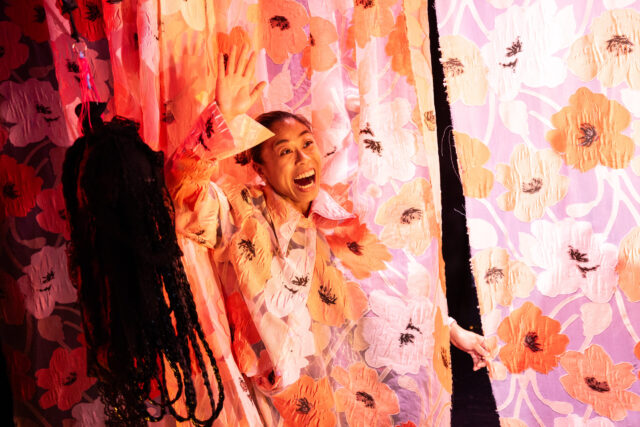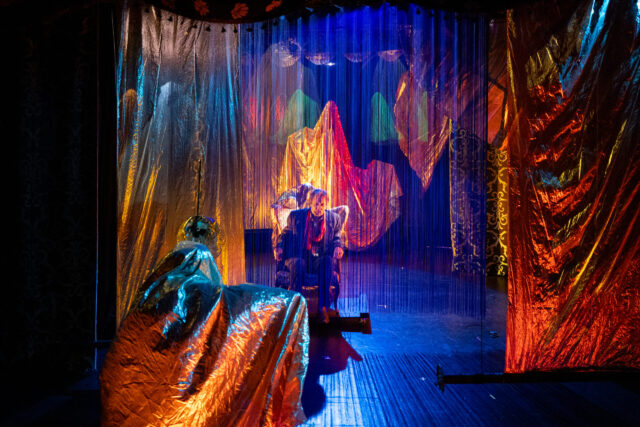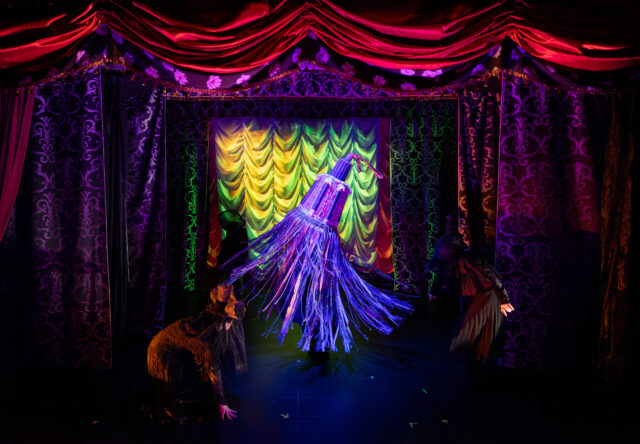
Nikki Calonge merges with the scenery in Normandy Sherwood’s Psychic Self Defense (photo by Maria Baranova)
PSYCHIC SELF DEFENSE
HERE Arts Center
145 Sixth Ave.
Tuesday – Sunday through September 30, $10-$100
here.org
“We should never respond to attack by attack, thus bringing ourselves down to the moral level of our attackers, but rely upon more humane methods, which are, in reality, equally effectual and far less dangerous to handle,” British occultist and Society of the Inner Light founder Dion Fortune writes in her 1930 book Psychic Self-Defense: The Classic Instruction Manual for Protecting Yourself Against Paranormal Attack.
Writer, designer, director, and performer Normandy Sherwood appropriates that title for her unusual show, Psychic Self Defense, continuing at HERE Mainstage Theater through September 30.
The unique theatrical experience begins with ticket holders being divided into small groups and led by a mysterious figure in black at the outside stage door through short hallways done up in Victorian horror-splendor, with low-hanging chandeliers, glowing orbs, bell pulls, and various ornate fabrics decorating the walls. The audience is brought to a small space with four rows of rising seats, some featuring knitted, elaborate antimacassars. There’s a bar separating the crowd — limited to no more than forty-four people — from the stage, which is several feet below, making it difficult to see the action when it is up front.

Ean Sheehy takes an uncomfortable seat in unique work at HERE (photo by Maria Baranova)
Curtains have become a disappearing element of theater; more often than not these days, both on and off Broadway, there is no curtain when attendees enter the theater; the set is already open and visible, eliminating the thrill of revelation. But Psychic Self Defense has curtains galore, of all sizes, banks and banks of them in different colors, designs, and fabrics, a seemingly endless stream of lovingly designed and potentially menacing barriers.
Early on, Ean Sheehy and Nikki Calonge take the stage, both pointing out that they are practicing “psychic self-defense.” There is no other dialogue or traditional narrative. Over the course of about fifty minutes, the two characters are enveloped by the curtains, eerie creatures in black, and fanciful beings draped in bolts of shiny fabric — part Disney fantasy, part DIY entities that would feel right at home on Lost in Space, the animated Beauty and the Beast, or Sigmund and the Sea Monsters (only more elegant). As time passes, one group of beings form a kind of charming family unit, albeit perhaps with a taste for human blood. While Sheehy attempts to fight off all comers, Calonge, her enormous smile dominating the set, takes a different approach, considering assimilation, since resistance just might be futile.
Wickedly cool and creepy projections are beamed onto the curtains, interacting with Christina Tang’s coolly unpredictable lighting, while sound designer Craig Flanagin’s original score incorporates bangs, knocks, whistles, creaks, and other dissonant, sometimes disturbing electronic noises. (Sherwood and Flanagin are both members of the Drunkard’s Wife theater company and the no-wave postpunk band God Is My Co-Pilot.)
Psychic Self Defense needs a little time to warm up. It’s a delight watching Calonge, but Sheehy is not nearly as engaging. The set and costumes have a charming, homespun, handmade feel, but some of the magic is not quite Mummenschanz level; you can see hands pulling objects and faces hiding behind curtains when they’re supposed to be invisible. But the show — performed by Sheehy, Calonge, Flanagin, Sherwood, Daniel Allen Nelson, Kate Brehm, Adrienne Swan, and Elyse Durand — kicks into high gear just past the halfway point, as the curtains and creatures assume control.

Strange beings take over in Psychic Self Defense at HERE (photo by Maria Baranova)
The show, a presentation of HERE’s Dream Music Puppetry program, identifies itself as “part séance,” but it doesn’t ever turn in that direction. It was created by Sherwood (Madame Lynch, Tiny Hornets) during the pandemic, when people were unable to connect to one another in person, and it could benefit from more interactivity. It does offer plenty of surprises and unusual things to look at— fans of textiles and patterns will be well rewarded — but a lot of it is head-scratchingly perplexing and abstruse.
Although there is no need to dig deep to try to find a cohesive narrative, the play does seem to be hinting at the future state of independent theater, which is suffering greatly right now around the country. In Psychic Self Defense, the robotic props and curtains are swallowing the space and the human aspects of storytelling, as if AI is firmly in command of this piece of object theater.
Perhaps we’ll all need to read Robert Bruce’s 2011 book The Practical Psychic Self-Defense Handbook: A Survival Guide, in which the author writes about unseen environments, addicted and deranged ghosts, psychic interference, and other paranormal situations. However, he also notes in a legal disclaimer that “while spiritual and psychic protection and cleansing are the main focus of this book, there are no guarantees that you will experience or achieve anything whatsoever from following any of the instructions, procedures, and advice given within this book.”
[Mark Rifkin is a Brooklyn-born, Manhattan-based writer and editor; you can follow him on Substack here.]